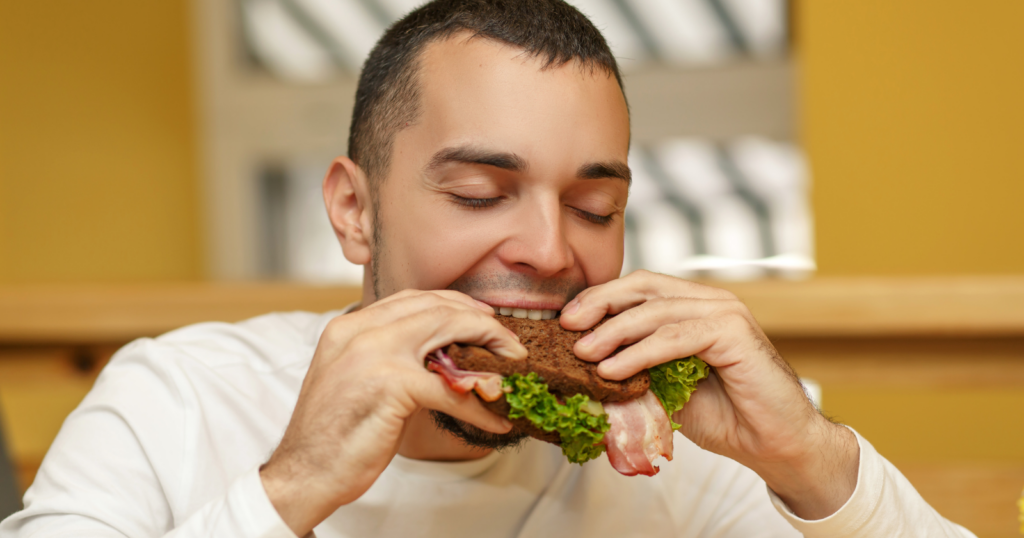Back then, I was just a regular guy who loved his food a bit too much and a bit too fast. I was oblivious to the psychological implications that were tied to my peculiar habit of eating quickly even when relaxed.
That was until I stumbled upon these 7 ingrained habits that psychology associates with fast eaters.
In this piece, I’m going to share these intriguing findings with you. Hopefully, they will provide as much insight and self-awareness for you as they did for me.
So, let’s delve in.
Above is the introduction written for the article titled “If someone eats quickly even when relaxed, psychology says they may have these 7 ingrained habits”.
1) Impatience
The first ingrained habit I noticed, which was quite a revelation for me, was impatience.
You see, I’ve always been a swift eater, gulping down my meals as if there’s a ticking time bomb nearby. It’s not that I was always in a hurry, it was just how I ate.
Psychology suggests that eating quickly, even when relaxed, is often an indication of impatience in other aspects of life. Yes, the way we eat can reflect our approach to life.
For me, it was like a mirror reflecting back at me, forcing me to confront my constant state of rush. Why was I always in such a hurry? What was the underlying cause?
So, I began to monitor my actions. Every time I felt the urge to rush through something, I would pause and ask myself why. Slowly but surely, I started to become more patient and present in my day-to-day tasks.
If you are a fast eater like I used to be, take a moment to reflect on your levels of patience. Are you always trying to get things done quickly? Do you often feel rushed even when there’s no need?
This self-awareness could be your first step towards understanding your eating habits and potentially working on improving them.
2) Emotional eating
The second habit that struck me was emotional eating.
I’ve always been a quick eater, but it took me a while to realize that I also had a tendency to eat more when I was feeling stressed or upset. It was like I was using food as a coping mechanism for my emotions.
Turns out, this is a common behavior known as ’emotional eating’. Psychology says it’s when we use food to make ourselves feel better—to fulfill emotional needs, rather than physical hunger.
I remember one particular evening after I had a rough day at work. I sat down with a tub of ice cream and before I knew it, I’d finished the whole thing. Looking back, I wasn’t really hungry—I was just trying to soothe my feelings of stress and frustration.
From then on, I started to make a conscious effort to distinguish between physical hunger and emotional hunger. This understanding allowed me to address my feelings in healthier ways, rather than resorting to overeating.
So if you’re a fast eater, take some time to reflect on your relationship with food. Are you reaching for that extra snack because you’re truly hungry or are you trying to fill an emotional void? Recognizing this pattern could be the start of creating healthier eating habits.
3) Lack of mindful eating
As a quick eater, I had a habit of wolfing down my meals without really paying attention to what I was eating or how much I was consuming. It was as if eating was just a task to be completed, rather than an experience to be savored.
Psychologists call this ‘mindless eating‘ – when we eat without paying attention to what and how much we’re consuming. This unconscious act could lead to overeating and weight gain over time.
I recall one incident when I was at a dinner with friends. I finished my meal way before everyone else and realized that I couldn’t even remember the taste of the food. It was like I had eaten on autopilot.
That’s when it dawned on me—I needed to practice mindful eating. So, I started to consciously slow down, savor each bite, and truly appreciate the flavors of my food. This not only made my meals more enjoyable but also helped me feel fuller faster and ultimately, control my portion sizes.
Learning to eat mindfully can not only improve your relationship with food but also help you enjoy your meals more and avoid overeating.
4) Ignoring hunger and fullness cues
Psychology tells us that it takes about 20 minutes for our brain to register the feeling of fullness. So, if we eat too quickly, we might consume more food than required before this signal kicks in.
A study conducted by the Journal of the Academy of Nutrition and Dietetics supports this notion. The study found that slow eaters tend to feel fuller faster and experience less hunger between meals compared to fast eaters.
I remember one lunchtime where I purposefully decided to slow down my eating pace. To my surprise, I felt full halfway through my usually portioned meal. It was a clear indication that I had been overshooting my hunger cues all this while.
So, if you’re a fast eater, consider the pace at which you’re eating. Are you giving your brain enough time to recognize when you’re full? If not, try slowing down. It could help you eat less and feel more satisfied after meals.
5) Preference for fast-paced environments
People who eat quickly often prefer high-intensity, fast-paced environments. They are typically active and energetic individuals who struggle to sit still and relax.
I recall my weekends used to be packed with activities and errands. There was hardly any time for relaxation or leisurely meals. It was as if I was in a perpetual race against time.
Recognizing this, I started to consciously slow down and make time for relaxation.
Instead of scheduling back-to-back activities, I started to leave gaps in between for quiet reflection or simply doing nothing. This not only helped me slow down my eating pace, but also brought more balance into my life.
So if you’re a fast eater, take a moment to reflect on your daily routines and lifestyle. Do you prefer a fast-paced life? If so, consider incorporating some down-time into your schedule. It could help you slow down your eating pace and bring more balance into your life.
6) Tendency towards perfectionism
From work tasks to personal projects, some of us constantly push ourselves to achieve the best results, often at the cost of our own peace of mind.
Perfectionists are often high achievers who set excessively high standards for themselves. This drive for perfection can seep into all aspects of their lives, including their eating habits.
Let’s resonate this quote by renowned psychologist Dr. Brene Brown: “Perfectionism is not the path that leads us to our gifts and to our sense of purpose; it’s the hazardous detour.”
It will not be easy to let go of perfectionist tendencies, yes, it will take time, but letting go means slowing down this eating pace and bringing more balance into life.
If you’re a fast eater, reflect on your attitudes towards perfection. Are you setting unrealistic standards for yourself? If so, consider practicing self-compassion and embracing your imperfections. It might help you slow down your eating pace and live a healthier, happier life.
7) A desire for efficiency
Interestingly, psychology suggests that people who eat quickly often value efficiency in various aspects of life. They seek to complete tasks as quickly and effectively as possible, even when it comes to eating.
I recall how my lunch breaks used to be—grabbing a quick bite and then rushing back to work. Meals were just another task on my to-do list.
However, the counterintuitive part is: while eating quickly might seem efficient, it can actually lead to overeating and potential health issues in the long run. So while it might save time now, it could cost you more time (and health) later.
It took me some time to realize this, but once I did, I made a conscious effort to slow down during meals. Here’s a practical tip: try setting a timer for 20 minutes for your next meal. Take the full time to eat, savoring each bite and enjoying the experience.
Conclusion
Uncovering these seven ingrained habits was an enlightening journey for me. If you also tend to eat quickly, I hope this article has shed some light on potential psychological reasons behind your eating pace.
Remember, change doesn’t happen overnight. It’s all about taking small steps towards improvement. Start by becoming more mindful of your eating habits. Slow down, savor your food, and pay attention to your hunger and fullness cues.
And most importantly, don’t be too hard on yourself. Eating is one of life’s greatest pleasures—enjoy it!
Next time you sit down for a meal, take a deep breath and remind yourself: it’s not a race. Happy eating!

















